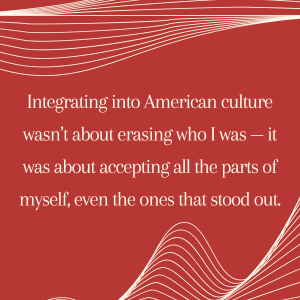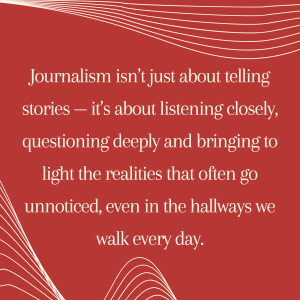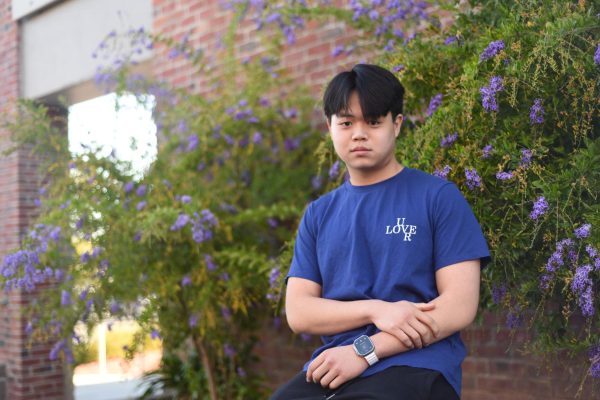When I first arrived at MVHS as a sophomore, I didn’t know a single person. Coming from Singapore, a place where modesty and reservation are deeply woven into everyday life, stepping into the extroverted, fast-moving world of an American high school felt disorienting.
I was an introvert by nature, but the cultural shift made it even harder to navigate. Students didn’t just raise their hands in class; they sought out teachers during office hours, asked for extra resources and engaged in conversations that sometimes blurred the lines between academic help and personal mentorship. I found this intimidating, since back home, approaching a teacher directly — especially with casual familiarity — would have felt disrespectful. Here, it was expected.
That initial discomfort put me at a disadvantage. I hesitated to ask for help even when I needed it, fearing that I would be seen as either bothersome or incompetent. For a while, I kept quiet, struggling through challenges I could have made easier through a simple conversation.
But as time passed, I realized that if I didn’t adjust, I would only be restricting myself from opportunities that others were readily taking. The competitive nature at MVHS made me learn to be a little bolder, a little more indifferent to the discomfort. Each small step — sending an email to a teacher, raising my hand during discussions, volunteering for group projects — felt monumental.
Sophomore year marked another pivotal moment when I was interviewed for an El Estoque article about my Singaporean accent. At first, I was hesitant. My accent, after all, was a lingering mark of the differences between me and my classmates. But the experience forced me to reflect on how much weight I had given to something that, in reality, most people hardly noticed. Speaking about my background openly made me realize that embracing my accent instead of hiding it allowed me to connect more authentically with others.

Gradually, I stopped thinking of my accent as a barrier. Friendships became easier and conversations became more natural. Integrating into American culture wasn’t about erasing who I was — it was about accepting all the parts of myself, even the ones that stood out.
The large Asian American community in Cupertino also helped soften the transition. Many students were the children of first or second-generation immigrants, and while our backgrounds varied, there was a shared work ethic and understanding that bridged the gaps. The more I opened up, the more warmth I found.
If I had to sum up my experience with one phrase, it would be this Chinese proverb: 近朱者赤, 近墨者黑. Roughly translated, it means, “One who stays near vermillion is stained red; one who stays near ink is stained black.” We are shaped by the company we keep, for better or worse.
At MVHS, I’m fortunate to be surrounded by some of the most hardworking, dynamic and inspiring people I have ever met. They showed me that it was possible to balance grueling academics with vibrant, unique personalities. Their energy challenged me to be kinder, more ambitious and more open to experiences I might have shied from before.
Still, I knew there were more ways I could push myself to grow.
My senior year, I decided to join El Estoque. I had considered it during my junior year but ultimately hesitated, worried that adding another commitment to my coursework would stretch me too thin. I entered the journalism class with low expectations. After two years of intensive literature classes, I didn’t think I could learn much more about writing or critical thinking. But I was wrong.
Working with multimedia design and journalism turned out to be one of the most enriching experiences of my high school career. It wasn’t just about improving my technical skills — though I certainly did — but about learning to collaborate in real-world conditions by meeting deadlines, pitching ideas and balancing creativity with structure.
I found myself in awe of my classmates, many of whom displayed an astonishing mix of inquisitiveness, artistry and professionalism. Journalism, more than any other class at MVHS, pushed me to think beyond school assignments to real issues affecting the world around me.

When I was working on a feature article about students facing mandatory military service, I gained insight into the hidden struggles of MVHS’s international community — students who quietly balanced school life while navigating complicated legal hurdles surrounding dual citizenship and conscription. Through that and many other experiences, I learned that journalism isn’t just about telling stories — it’s about listening closely, questioning deeply and bringing to light the realities that often go unnoticed, even in the hallways we walk every day.
Being a senior taught me that maturity isn’t a fixed trait or something you simply gain with age — it’s something you build with every risk you take to step a little further out of your comfort zone.
I came to America unsure if I would ever truly belong. I’m leaving with the knowledge that belonging isn’t about changing who you are to fit in — it’s about letting the best parts of others draw out the best parts of yourself.










